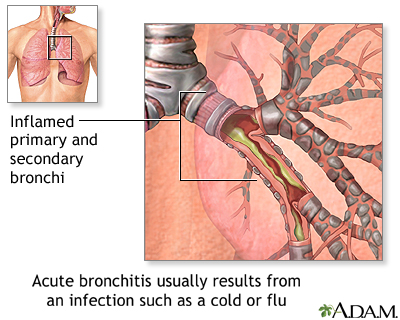| Acute bronchitis |
Bronchitis is an inflammation of the bronchial tubes, the part of the respiratory system that leads into the lungs. There are two types of bronchitis -- acute bronchitis and chronic bronchitis. Acute bronchitis usually appears after a respiratory infection, such as a cold, and can be caused by either a virus or bacteria. Chronic bronchitis does not have a sudden onset and is most frequently caused by long-term irritation of the bronchial tubes. Bronchitis is considered chronic if symptoms continue for 3 months or longer. Bronchitis caused by allergies can also be classified as chronic bronchitis.
Asthma is sometimes under diagnosed, especially in children under 5 years old. Their asthma is sometimes labeled as bronchitis or wheezy bronchitis. Although not all wheezes and coughs are caused by asthma, asthma should be considered whenever there is episodic, chronic, or recurrent cough or wheezing without a clear reason -- especially in children.

What are the symptoms of acute bronchitis?
- Fever
- Painful cough
- Sore throat
- Production of thick, yellow mucus
- Shortness of breath or wheezing
What causes acute bronchitis?
Bronchitis results from an infection such as a cold or flu. The infection inflames the bronchial tubes, which causes the symptoms of bronchitis. Although acute bronchitis is relatively common, some people are more prone to it than others. People at a higher risk include smokers, individuals with respiratory illnesses such as asthma, and individuals exposed to high levels of airborne pollutants.
Is acute bronchitis dangerous?
Although bronchitis itself is not dangerous, the infection that causes the bronchitis may progress further into pneumonia. Bronchitis also may aggravate the symptoms of asthma or other breathing disorders. If a young child shows signs of bronchitis, consult a doctor, who may watch for any serious developments.
How is acute bronchitis treated?
The treatment of acute bronchitis depends on what caused it. Antibiotics can be used to treat bronchitis caused by a bacterial infection, but are ineffective for bronchitis caused by a virus. In children, bronchitis or nonspecific cough rarely warrants antibiotics. Generally, treatment of acute bronchitis does not require antibiotics because it is usually caused by a virus. Occasionally, if a cough has lasted more than 10 days and specific bacteria are suspected, a round of antibiotics may help. (Antibiotics do NOT help treat asthma flare-ups, although they may help some other lung diseases.)
Treatment of the bronchitis symptoms often includes pain relievers for sore throat, fever-reducing medications, cough suppressants, and humid air to ease dryness and cough. Check with your doctor before taking medications to reduce a cough. Cough suppressants may be recommended for nighttime use to enable a good night's sleep, but may be discouraged during the day to allow the body to cough out the mucus.
Can acute bronchitis be avoided?
For individuals who frequently develop acute bronchitis, the best way to avoid the illness is to avoid contracting colds or other respiratory infections. To do this, wash your hands frequently, avoid people with respiratory infections, and eat and sleep well. Smokers are encouraged to stop smoking, since they have a higher risk of developing both acute and chronic bronchitis.
In children, one of the most important steps is to keep them from breathing second-hand smoke.
Reference
National Asthma Education and Prevention Program Expert Panel Report 3: Guidelines for the Diagnosis and Management of Asthma. Rockville, MD. National Heart, Lung, and Blood Institute, US Dept of Health and Human Services; 2007. NIH publications 08-4051.
|
Review Date:
6/29/2012 Reviewed By: Allen J. Blaivas, DO, Clinical Assistant Professor of Medicine UMDNJ-NJMS, Attending Physician in the Division of Pulmonary, Critical Care, and Sleep Medicine, Department of Veteran Affairs, VA New Jersey Health Care System, East Orange, NJ. Review provided by VeriMed Healthcare Network. Previoulsy reviewed by David A. Kaufman, MD, Section Chief, Pulmonary, Critical Care & Sleep Medicine, Bridgeport Hospital-Yale New Haven Health System, and Assistant Clinical Professor, Yale University School of Medicine, New Haven, CT. Review provided by VeriMed Healthcare Network. (6/1/2010) |
© 1997- A.D.A.M., a business unit of Ebix, Inc. Any duplication or distribution of the information contained herein is strictly prohibited.
